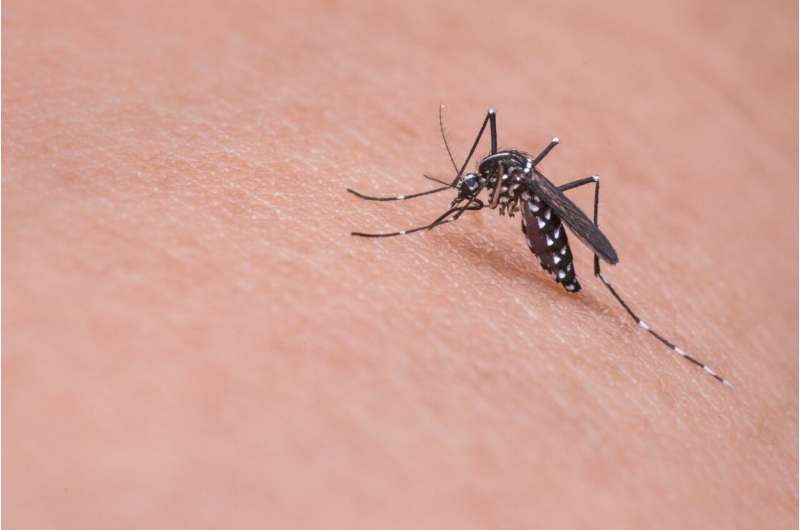This article has been reviewed according to Science X's editorial process and policies. Editors have highlighted the following attributes while ensuring the content's credibility:
fact-checked
peer-reviewed publication
trusted source
proofread
Protein in mosquito saliva shown to inhibit host immune response

Mosquito saliva is known to play a significant role in the transmission of viruses such as yellow fever, Zika, dengue, and chikungunya, yet many of its functions have yet to be understood. In a new study, researchers revealed that a mosquito salivary protein binds to an immune molecule in humans, facilitating infection in human skin caused by the transmitted virus.
The findings are published in Science Immunology.
Ticks and mosquitoes don't just inject pathogens, explains corresponding author Erol Fikrig, MD, Waldemar Von Zedtwitz Professor of Medicine (Infectious Diseases) and professor of microbial pathogenesis at Yale School of Medicine (YSM) and professor of epidemiology (microbial diseases) at the Yale School of Public Health. "Their saliva serves many purposes when it interacts with the human host," he said.
For the study, the team probed a curated yeast display library of human proteins with Nest1, a protein in the Aedes aegypti mosquito saliva that they had identified as important in previous research.
The researchers demonstrated that Nest1 interacts with human CD47, an immune receptor found on the surface of many cells in the body. CD47 controls several immune processes, including those that protect certain cells and destroy others.
"This interaction shows that the mosquito is trying to change the biological functions governed by CD47," said Alejandro Marín López, Ph.D., associate research scientist at YSM and the study's first author. "We saw that Nest1 is inhibiting some of these functions, like phagocytosis, the migration of immune cells, and the inflammatory response." These alterations help to enhance virus replication in the skin, he said.
This discovery increases our knowledge of how disease vectors—like mosquitoes—and hosts—like humans—interact, Marín López said, adding that the findings could lead to the development of therapies that may help prevent mosquito-borne diseases.
Surprisingly, the mosquito protein bound to CD47 with about 25 to 50 times stronger affinity than SIRPA, the human ligand that normally binds to CD47, Fikrig noted, which could have implications for treating various other conditions.
"Interactions between CD47 and SIRPA have been studied for many years, and drugs to prevent cancer and atherosclerosis are being developed based on that interaction," Fikrig said. "It's not impossible that this mosquito protein, which outcompetes SIRPA, could lead to new and better therapeutics for these and other diseases."
More information: Alejandro Marin-Lopez et al, The human CD47 checkpoint is targeted by an immunosuppressive Aedes aegypti salivary factor to enhance arboviral skin infectivity, Science Immunology (2024). DOI: 10.1126/sciimmunol.adk9872



















